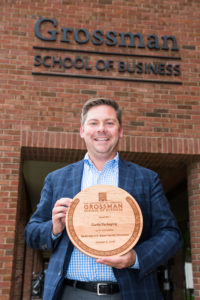EDITOR’S NOTE: This article is a collaboration between Cairn Cross of FreshTracks Capital and Diane Abruzzini ’17 of VENTURE.co Holdings, Inc. It is one of a series we will be publishing concurrently with FreshTracks Capital. Cairn Cross co-founded FreshTracks in 2000, and has worked as Managing Partner of the firm since that time. Notable FreshTracks VC investments include SunCommon, Mamava, and Eating Well. Cairn has helped to build a true Vermont entrepreneurial ecosystem by hosting pitch events, accelerator programs, workshops, and teaching at multiple Vermont universities and colleges. He is a former co-chair of The Sustainable Innovation MBA Advisory Board. Diane Abruzzini has built her career as a food and agriculture entrepreneur and business consultant. She was a student of Cairn Cross during her time at UVM’s Sustainable Innovation MBA program. After completing her degree, she spent time working for FreshTracks partners as an analyst. She currently works in marketing and communications at VENTURE.co Holdings Inc, who’s wholly owned subsidiary VENTURE.co Brokerage Services LLC is a FINRA-licensed broker-dealer.
The valuation process can be murky for both entrepreneurs and investors. Private company stock is typically a “Level III” asset under ASC Topic 820 and its value “cannot be determined by using observable inputs of measures such as market prices or models.” Fair value is estimated rather than observed through readily observable market prices.
Entrepreneurs and investors often disagree on the valuation approach that should be used in a particular transaction. Should one base a private company’s valuation on the comparable metrics for publicly traded companies operating in the same industries, or should one base valuation on the estimated present value of a projected stream of cash flow? If you use public market comparables, which metric is most important to valuation? Revenue? EBITDA? Users? Growth Rate? If estimating the net present value of a stream of cash flow, which discount rate do you choose and are you being too aggressive or conservative in cash flow estimates? Do you arbitrarily choose the mid-growth position? Every entrepreneur, venture capitalist (VC), broker-dealer (BD), and investment bank will use a variety of criteria in order to determine valuation. None of the approaches are perfect–there is no secret sauce–but there are important differences to how VCs and BDs tackle company valuations.
First, we must consider to whom VCs and BDs have responsibilities. VCs are trying to create strong investment returns for the Limited Partners (LPs) who are the investors in the VC fund. Valuation and other terms such as dividends will be negotiated to give the venture investors an investment return commensurate with perceived risk. Before making an investment, VCs rely on the business plan and financial projections supported by company documentation as well as prior investment experience among the VC partners and external due diligence efforts to determine a reasonable company valuation. Continue reading “The Cap Raise: Valuation”



 Reed got his start in advocacy and grassroots work in Michigan. He discussed the evolution of his thinking from an “us versus them” mentality (environmentalists versus business) to understanding business’s role in society (and the part that sustainability-minded professionals can play).
Reed got his start in advocacy and grassroots work in Michigan. He discussed the evolution of his thinking from an “us versus them” mentality (environmentalists versus business) to understanding business’s role in society (and the part that sustainability-minded professionals can play). Why did you choose to attend The Sustainable Innovation MBA program?
Why did you choose to attend The Sustainable Innovation MBA program?
 I always knew I wanted to get an MBA in the U.S. to learn all the necessary skills it takes to be an entrepreneur, but after working in an exclusively profit-driven environment, I wanted to make a career change and use my resources to do “something good.” I felt that The Sustainable Innovation MBA would teach me fundamental business skills and combine them with a sustainable perspective to create profitable businesses that benefit the environment and society — plus Vermont seemed like the perfect environment for a green MBA program.
I always knew I wanted to get an MBA in the U.S. to learn all the necessary skills it takes to be an entrepreneur, but after working in an exclusively profit-driven environment, I wanted to make a career change and use my resources to do “something good.” I felt that The Sustainable Innovation MBA would teach me fundamental business skills and combine them with a sustainable perspective to create profitable businesses that benefit the environment and society — plus Vermont seemed like the perfect environment for a green MBA program. Feedback is the breakfast of champions. Feedback is a gift. Without feedback, leaders are cut off from the lifeblood of an organization and their ideas and abilities will wither and die. These are the words of
Feedback is the breakfast of champions. Feedback is a gift. Without feedback, leaders are cut off from the lifeblood of an organization and their ideas and abilities will wither and die. These are the words of  Lesser known is the history of that time when, although many moved to Vermont to find and build a different way to live, a number also were inspired to find and build a different way to do business. Some of Vermont’s most iconic brands — like
Lesser known is the history of that time when, although many moved to Vermont to find and build a different way to live, a number also were inspired to find and build a different way to do business. Some of Vermont’s most iconic brands — like  Before joining the PYXERA team, Asiala had been the Director of Corporate Citizenship at Dow Corning Company. Over three decades in the corporate sector taught her that environmental and social sustainability are not hindrances to business; rather, they can ensure long-term success and profitability. She carries that vision forward in her current role at PYXERA, where she works to leverage the strengths of corporations, governments, social sector organizations, educational institutions, and individuals to solve complex problems in inclusive and sustainable ways.
Before joining the PYXERA team, Asiala had been the Director of Corporate Citizenship at Dow Corning Company. Over three decades in the corporate sector taught her that environmental and social sustainability are not hindrances to business; rather, they can ensure long-term success and profitability. She carries that vision forward in her current role at PYXERA, where she works to leverage the strengths of corporations, governments, social sector organizations, educational institutions, and individuals to solve complex problems in inclusive and sustainable ways.